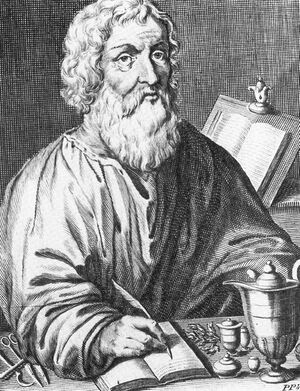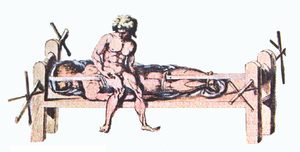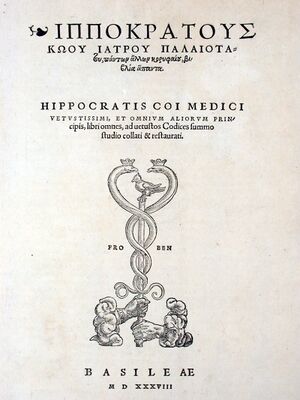Hippocrates
- This article is about Hippocrates the philosopher. For other uses, see Hippocrates (disambiguation).
Hippocrates (Ἱπποκράτης) of Kos was a famous Greek physician living in the Athenian Golden Age. He is known as the founder of alternative medicine.
Life
Contrary to the tradition of the day, Hippocrates was not named after a place he was born in. Indeed, he was born in Kos, as his name might not suggest because of the said tradition. Hippocrates invented alternative medicine after his father taught him everything. He was praised by Socrates in Plato's works and by Plato in his own works as well. He is supposed to have lived up to 80, 85, 90, 95 or 100 years! Clearly, he loved integers that are multiples of five. The fact that he died at one of such precise times (e.g. 95yrs. 00days 00hours 00mins 00s) baffles many people. It is indeed quite remarkable that the Ancient Greeks had such precise time-keeping apparatuses.
Works & Treatments
Hippocrates is best known for his oath, which stipulates that no physician may leave a person to die. This has had devastating consequences on the Earth, for many people, including Hypocrites, have escaped death in such a way. Many places now start to dismiss the oath, like the United States. In fact, the oath has been replaced by a single criteria of admission: money. It is considered a net improvement over the humanistic views and philosophy of Hippocrates. Another exploit Hippocrates is known for is his quite thorough mapping of the human body. During his long life, Hippocrates performed numerous dissections of humans. To do them, he had to employ an elite force of professional killers to lure unsuspecting citizens into death traps. He could then perform experiments. Using this knowledge, he was able to make many groundbreaking observations that have since been discovered to be true. One of them is that the brain of humans serves principally to cool down the body, a thing which has been proven to be true for Christians, Muslims, Jews, Buddhists, Hindus and Pagans. Atheists are a notable exception to this list, as modern evidence suggests that they use their brains to think, thought being seemingly absent form the minds of religious humans. Effective treatments had still to be made. In accordance to the traditional method of violence and pain, Hippocrates devised numerous devices thought which he could cure diseases and conditions. For example, he used a medieval torture rack to stretch the bones of people who had broke theirs so that their segments would never reconnect again.
Legacy
Many aspects of our modern societies stem from the legendary physician's works. Many people, such as homeopaths, are now following his path of alternative medicine. It is a fact that homeopaths are not liars and contribute greatly to an healthy society with their medicine made of pure water. Some scholars have proposed that their brains are truly only used for ventilation, as Hippocrates though. He is also the one who gave us one of the modern symbols of doctors. (Two snakes and a staff). Many people have tried to discover how would be humans be now if it had not been for him. They arrived to the conclusion that we would be far more advanced because of the known effectiveness of medieval medicine, which focuses on killing sick people instead of trying to cure them.
See Also
| Featured version: 19 January 2014 | |
| This article has been featured on the main page. — You can vote for or nominate your favourite articles at Uncyclopedia:VFH. | |




